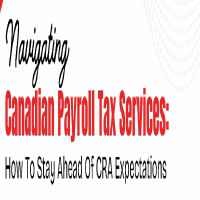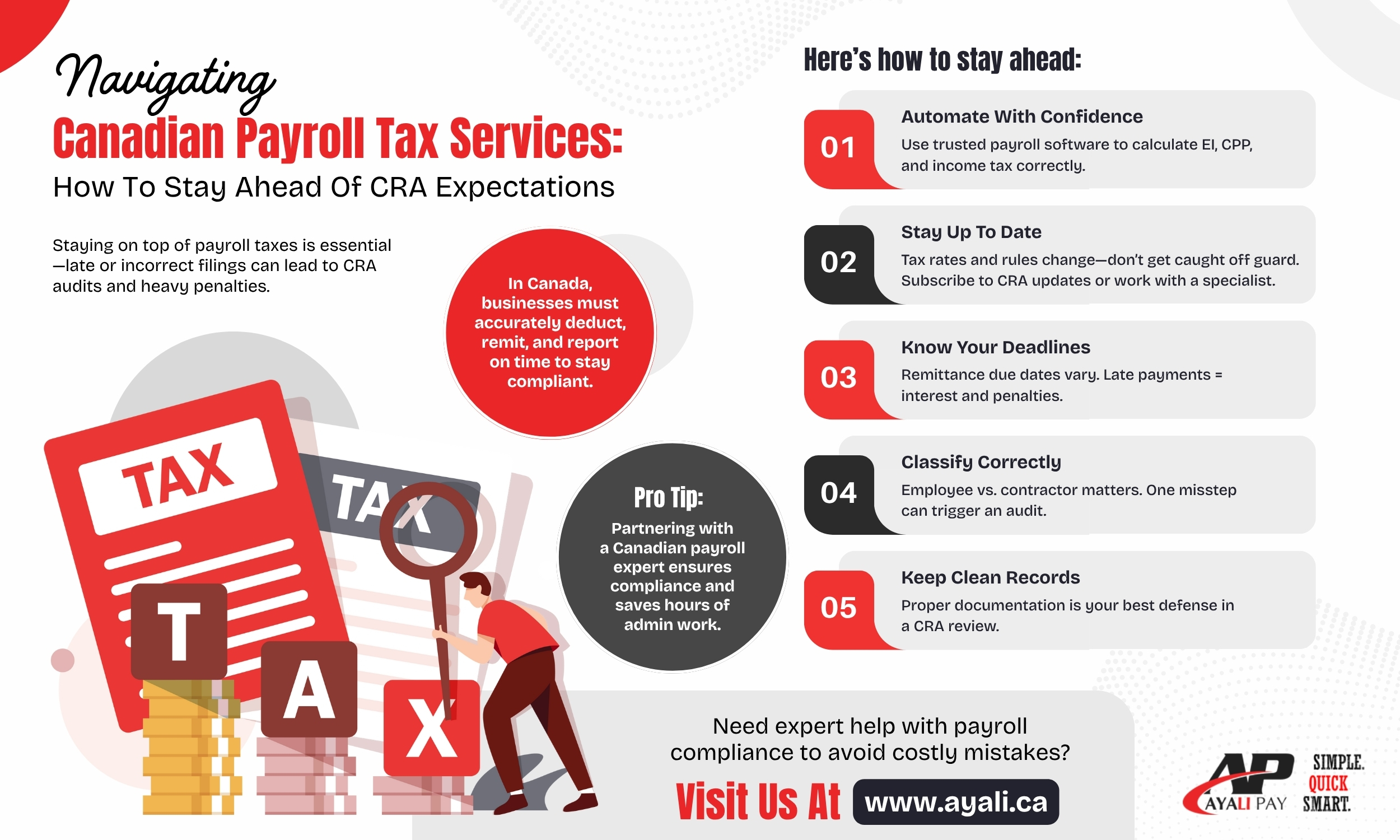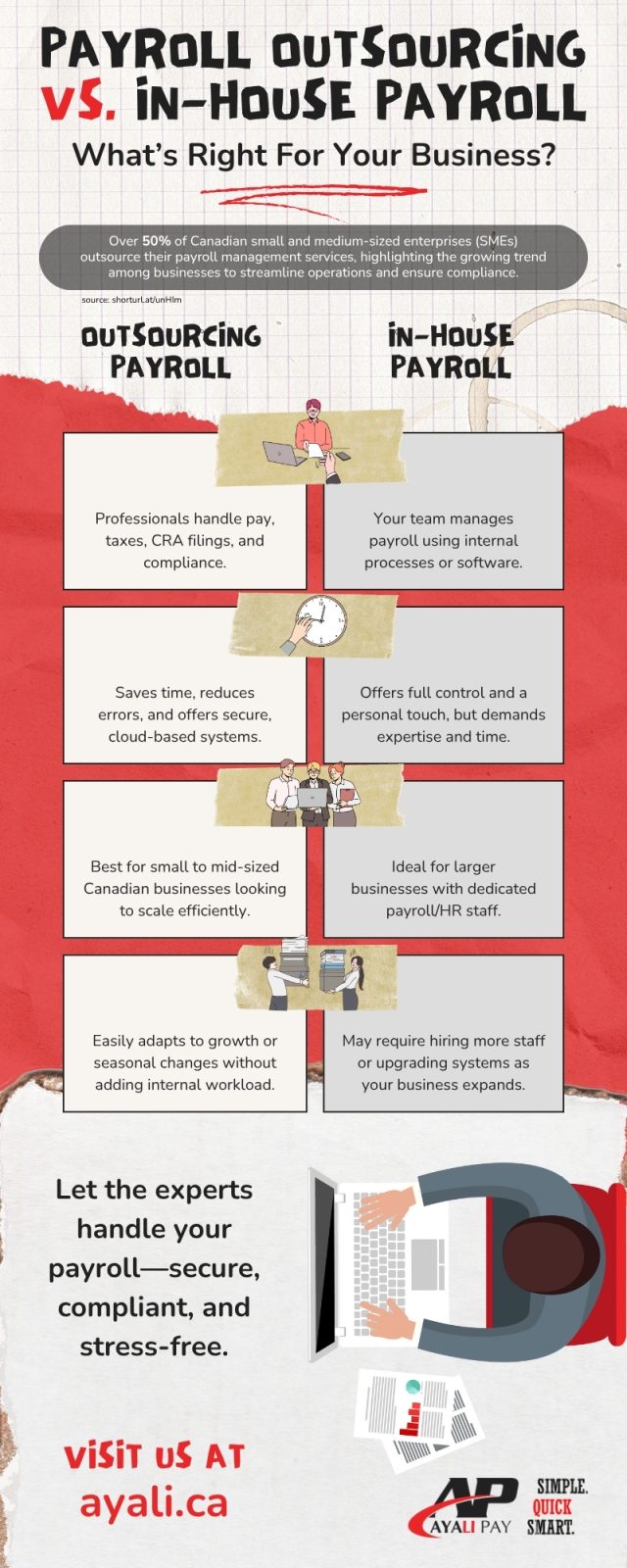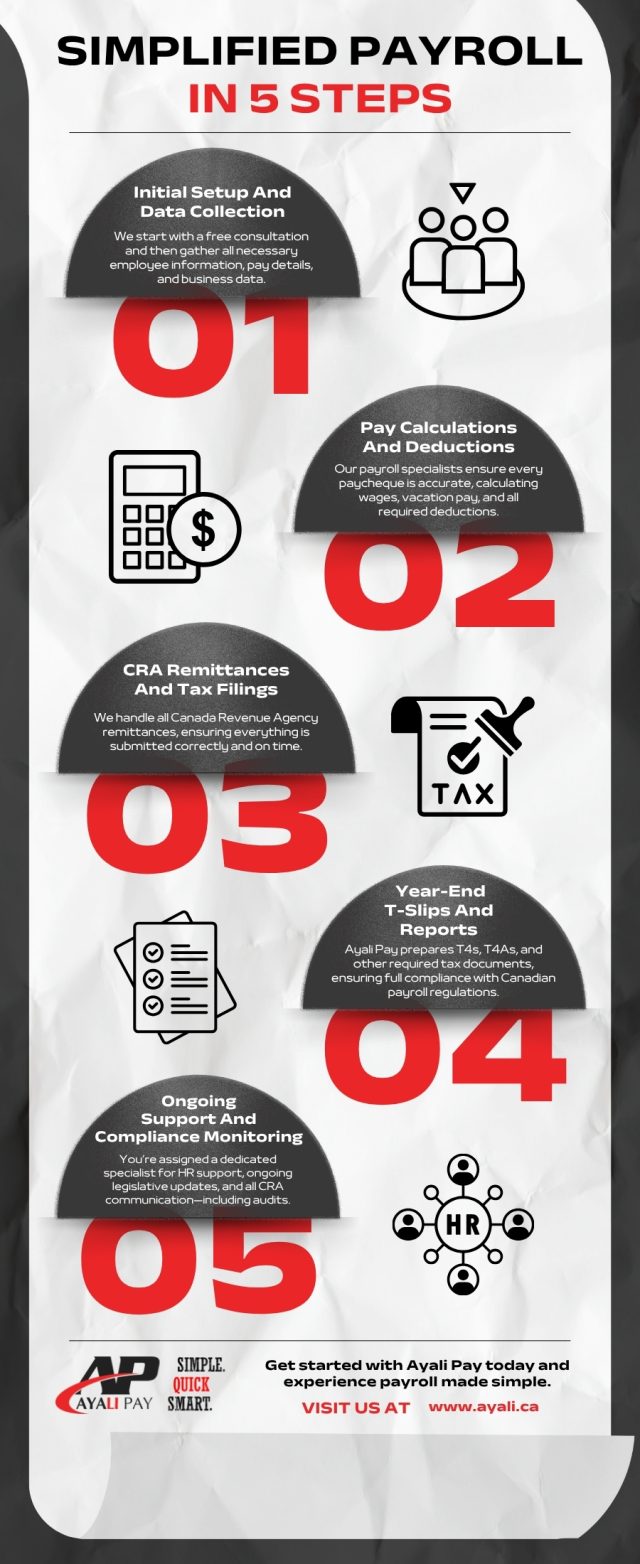Uncategorised Archives - Ayali Pay - Simple. Quick. Smart.
Payroll compliance is a cornerstone of any business’s operations in Canada. However, with each province enforcing its own unique rules and regulations, provincial payroll compliance becomes an intricate challenge. Employers, especially those with a presence across multiple provinces, must navigate not only federal labor laws but also a patchwork of provincial regulations that can significantly impact how payroll is managed.
This blog delves deep into the regional complexities of payroll compliance, highlighting the need for all-inclusive payroll services in Toronto Canada, exploring the difficulties businesses face, and underscoring the importance of fully-managed payroll solutions like those offered by Ayali Pay.
Understanding the Basics: Federal vs. Provincial Payroll Compliance

Operating a business in Canada comes with the significant responsibility of adhering to various layers of payroll legislation. Payroll compliance in the Canadian landscape isn’t a simple, uniform process—it’s a multifaceted system governed by both federal and provincial/territorial laws, each with its own requirements, rules, and enforcement mechanisms.
At the federal level, the Canada Revenue Agency (CRA) is responsible for overseeing and administering several core components of payroll. These include:
- Income tax deductions: Employers are required to deduct the correct amount of federal income tax from employee pay based on up-to-date tax tables and individual employee details.
- Employment Insurance (EI): Contributions to EI provide financial support to employeesduring periods of unemployment or eligible leave, such as maternity or sickness.
- Canada Pension Plan (CPP): Employers and employees both contribute to CPP, which helps provide retirement, disability, and survivor benefits.
While federal regulations provide a baseline and are consistent across the country, each province and territory introduces its own specific payroll compliance requirements, adding another critical layer of complexity. These regional regulations vary widely and influence the following key areas:
- Minimum Wage: Each province sets its own hourly wage floor, which is subject to change on an annual or semi-annual basis. This means that a business operating in both Alberta and British Columbia, for example, must track and apply different minimum wage thresholds in each location.
- Overtime Pay: Rules regarding when overtime is triggered and how it’s calculated differ by province. Some regions mandate overtime after 8 hours in a day, others after 44 hours in a week. Calculating this incorrectly can lead to costly errors and potential legal challenges.
- Statutory Holidays: The number of statutory holidays, eligibility criteria, and compensation for employees who work on these days are determined at the provincial level. For instance, Ontario recognizes different holidays than Newfoundland or Quebec, and rules for entitlement also vary.
- Paid Leaves: Leaves such as bereavement, family responsibility, and sick leave are handled provincially. The length of leave, whether it’s paid or unpaid, and the conditions required to qualify differ significantly across jurisdictions.
- Termination Pay and Severance: Each province has its own mandates regarding termination notice periods and severance payments. Employers must be aware of these differences to ensure that employees are treated fairlyand that dismissals are handled legally and compliantly.
- Workers’ Compensation: This area is governed by individual provincial boards (e.g., WSIB in Ontario, WCB in Alberta). The rules around employer contributions, injury reporting, and employee benefits following workplace injuries differ based on the province or territory of employment.
- Vacation Entitlements: Provinces establish their own minimum standards for vacation time and pay. While two weeks’ vacation is generally the norm, some regions require more generous entitlements after a certain period of service.
As a result, the Canadian payroll landscape is not a “set it and forget it” system. Rather, it’s an evolving structure that demands ongoing awareness, consistent updates, and a region-specific approach.
For any organization, especially those with employees spread across multiple provinces, maintaining provincial payroll compliance becomes more than just a function of cutting paychecks—it becomes a strategic obligation to avoid legal risks, uphold employee rights, and ensure the integrity of business operations.
Navigating this dual regulatory environment calls for more than just internal effort—it requires reliable systems, up-to-date knowledge, and often the support of fully-managed payroll services that can handle the intricacies on your behalf. This is where having access to all-inclusive payroll services in Canada becomes not just helpful, but essential for long-term business stability.
Why Payroll Varies by Province

Each province in Canada reflects its unique economic, social, and political context through employment standards legislation. Let’s look at how some key provinces differ when it comes to payroll compliance:
Ontario
Ontario is one of the most populous provinces and hence a focal point for many employers. The Employment Standards Act, 2000 (ESA) governs payroll-related issues.
- Minimum Wage: Updated regularly; currently $17.20/hour. Expected to rise to $17.60/hour (effective October, 2025).
- Vacation Entitlement: Two weeks after each 12-month period, three weeks after five years.
- Termination Pay: Varies based on years of service.
The complexity in Ontario arises from frequent changes and exceptions, especially for different industries and employee categories, making fully-managed payroll services in Canada invaluable for businesses operating here.
British Columbia
B.C.’s Employment Standards Act outlines employee entitlements that differ significantly from other provinces.
- Minimum Wage: $17.85/hour (effective June 1, 2025).
- Daily Overtime: Payable after 8 hours in a day.
- Statutory Holidays: 11 recognized holidays, with specific rules on eligibility for stat pay.
Because of the nuanced rules, many businesses prefer to use all-inclusive payroll services in Canada that cover compliance monitoring and implementation.
Alberta
Alberta is known for its business-friendly environment but has its own unique set of payroll laws.
- Minimum Wage: $15.00/hour (no change since October 1, 2018).
- General Holidays: 9 statutory holidays, with rules on eligibility.
- Overtime: Paid at 1.5x after 8 hours/day or 44 hours/week.
Alberta’s requirements around compressed workweeks and averaging agreements make business payroll solutions with deep regional knowledge essential.
Quebec
Quebec operates quite independently in many respects, including payroll.
- Minimum Wage: $16.10/hour (effective May 1, 2025).
- Language Laws: Pay stubs and documents must be in French.
- Holiday Pay: Specific eligibility rules apply for paid statutory holidays.
Unique to Quebec is the Commission des normes, de l’équité, de la santé et de la sécurité du travail (CNESST) which enforces employment standards. Navigating Quebec’s payroll rules without fully-managed payroll support can be a daunting task for businesses unfamiliar with its structure.
Saskatchewan
Saskatchewan has its own Employment Standards that diverge from federal norms.
- Minimum Wage: $15.00/hour (effective October 1, 2024).
- Overtime Pay: 1.5x after 8 hours/day or 40 hours/week.
- Public Holidays: 10 per year with qualifying rules.
Although smaller, the province presents its own compliance quirks—especially in agriculture and seasonal employment—making provincial payroll compliance just as critical.
Atlantic Provinces (Nova Scotia, New Brunswick, Newfoundland & Labrador, Prince Edward Island)
These provinces often have lower minimum wages but stricter holiday and vacation entitlements.
- Nova Scotia: $16.50/hour (effective October 1, 2025)
- PEI: Overtime kicks in after 48 hours/week
- New Brunswick: Different rules for public holidays and vacation pay accrual
Companies working across multiple Atlantic provinces can face overlapping responsibilities that require constant updates and expertise. Here, all-inclusive payroll services in Canada are not a luxury but a necessity.
The Challenges of Regional Payroll Compliance
Running payroll across multiple jurisdictions isn’t just about paying employees on time. It involves:
- Tracking legislative changes: Provinces often update employment standardswith little warning.
- Interpreting complex rules: Some rules are industry-specific or contain gray areas.
- Managing multi-location payroll: Different minimum wages, vacation entitlements, and holiday eligibility.
- Training HR/payroll staff: Maintaining internal knowledge for each region is costly and time-consuming.
- Audit risk: Non-compliance can lead to significant penalties and reputation damage.
When these challenges pile up, relying on business payroll solutions designed to navigate regional complexities becomes the smart move.
The Case for All-Inclusive Payroll Services in Canada

Let’s be honest—trying to stay compliant while growing a business is no small feat. That’s why more businesses are turning to all-inclusive payroll services in Canada that offer:
- Automatic updates to comply with provincial changes
- Employee self-service portals
- Tax filing and remittance
- Year-end T4 preparation
- Multilingual support (especially important in Quebec)
- Robust reporting tools
The goal is fully-managed payroll—where you no longer have to worry about compliance slips, software updates, or documentation in the wrong language.
How Fully-Managed Payroll Solves Regional Challenges
A fully-managed payroll solution doesn’t just run your payroll—it proactively ensures you’re compliant in every region where your employees work. Here’s how it helps:
- Centralized dashboard: View compliance status across provinces at a glance.
- Automated calculations: No manual overtime or vacation pay errors.
- Built-in audit trail: Ensure accurate and compliant records for any provincial inspection.
- Employee classification checks: Avoid penalties for misclassifying contractors or part-timers.
When you choose a provider that specializes in provincial payroll compliance, you’re buying peace of mind.
Why Businesses Trust Ayali Pay for Payroll Compliance Across Canada
At Ayali Pay, we specialize in business payroll solutions that take the burden of compliance off your shoulders. Our fully-managed payroll services are built for Canadian businesses of all sizes and tailored to meet the requirements of each province.
With Ayali Pay, you get:
- Real-time compliance updates
- Multilingual support
- Seamless onboarding and employee self-service
- CRA and Revenu Québec remittances
- Statutory holiday and vacation tracking by province
- Dedicated payroll specialists
Whether you’re a small startup in Toronto or a multi-province corporation with employees in B.C., Alberta, and Quebec, we provide all-inclusive payroll services in Canada that ensure you’re always ahead of the game.
Ready to Eliminate Compliance Guesswork?
Don’t let the complexities of provincial payroll compliance slow your business down. With Ayali Pay’s fully-managed payroll solutions, you can focus on what matters—growing your business—while we take care of the rest.
Visit our online inquiry/scheduling form to contact us and schedule your consultation today. Let’s simplify your payroll, together.
Managing employee benefits in Canada is no small feat. As businesses grow and regulations evolve, navigating the complexities of health insurance, retirement plans, and paid leave becomes increasingly challenging. The stakes are high—missteps can result in financial penalties, non-compliance, and employee dissatisfaction. That’s where payroll services come in. Specifically, robust payroll for employee benefits plays a central role in keeping Canadian businesses compliant, efficient, and competitive.
In this blog, we’ll explore how all-inclusive payroll services in Canada simplify benefits management, the legal frameworks at play, and how your business can optimize processes through fully managed payroll. Finally, we’ll show you why partnering with Ayali Pay is your best move forward.
Understanding the Landscape of Employee Benefits in Canada

In Canada, employee benefits are governed by a combination of federal and provincial legislation. Common statutory benefits include:
- Canada Pension Plan(CPP) contributions
- Employment Insurance (EI) premiums
- Paid public holidays
- Parental and maternity leave
- Workplace safety insurance
On top of these, many employers offer extended health insurance, dental care, retirement savings plans, disability coverage, and wellness programs. While these perks are not legally required, they’re essential for attracting and retaining top talent.
But with complexity comes confusion. Varying jurisdictional rules and constant regulatory updates create a moving target. Keeping track of changes in payroll tax rates, minimum wage laws, and employer contribution requirements is nearly impossible without specialized tools and knowledge.
This is where advanced business payroll solutions become indispensable.
The Challenges of Managing Employee Benefits Without Expert Payroll Help

For companies that try to manage everything manually or through outdated systems, several issues often arise:
1. Compliance Risks
Failing to correctly calculate and remit benefits like EI, CPP, or employer-paid health premiums can result in fines and audits. Payroll compliance requires a deep understanding of local and national rules, something few in-house HR departments can consistently provide.
2. Administrative Overload
Manually tracking vacation accruals, sick leave, or RRSP contributions drains time and resources. Not to mention the burden of year-end tax documents and ROE (Record of Employment) filings.
3. Employee Frustration
Errors in pay stubs, missing benefit deductions, or delayed reimbursements can damage morale and create legal exposure. Employers must ensure precise coordination between payroll and benefits programs.
The solution? Fully-managed payroll systems that seamlessly integrate employee benefits management.
The Solution: Payroll for Employee Benefits
Modern payroll for employee benefits solutions is no longer just about cutting cheques. They provide an integrated system that handles:
- Benefit eligibility tracking
- Real-time deductions for health premiums and pensions
- Employer contributions automation
- Leave management integration
- Statutory compliance auditing
- Custom reporting for audits and tax filing
These tools don’t just support back-office efficiency—they empower HR and finance teams to make strategic decisions based on data-driven insights.
When delivered as part of all-inclusive payroll services in Canada, these benefits are compounded with centralized control, consistent updates, and peace of mind.
What Makes All-Inclusive Payroll Services in Canada So Valuable?
As businesses grow and evolve, the demands placed on HR and payroll departments become more intricate. With numerous moving parts—from deductions and benefit eligibility to government filings and compliance—trying to handle everything in-house can quickly become overwhelming. This is where all-inclusive payroll services in Canada truly shine.
Let’s explore in greater depth what these comprehensive services offer and how they can transform the way you manage employee benefits:
1. Automation of Complex Calculations
Calculating payroll isn’t as simple as just tracking hours and issuing payments. In Canada, employers must account for multiple variables, including employer-matched RRSP contributions, health insurance premiums, taxable benefits, and other deductions. With all-inclusive payroll services in Canada, these complex calculations are handled through automation, drastically reducing the chances of manual errors. This ensures that payroll remains accurate, timely, and fully compliant with the Canada Revenue Agency (CRA). Automated systems also make adjustments quickly when employee statuses change or benefit plans are updated, keeping the process fluid and efficient.
2. Built-In Compliance Monitoring
Staying compliant with ever-changing federal and provincial employment laws is no easy task. From shifts in minimum wage to changes in contribution limits or leave entitlements, HR and payroll professionals must be constantly alert. Top-tier all-inclusive payroll services in Canada come equipped with real-time compliance monitoring tools. These systems are routinely updated to reflect the latest legal requirements, helping businesses stay on the right side of the law. This means you no longer need to sift through CRA bulletins or interpret legal jargon—payroll compliance is seamlessly integrated into every function.
3. Custom Employee Portals
Employee self-service is no longer a luxury—it’s an expectation. Leading business payroll solutions now offer secure, user-friendly employee portals that provide access to personal payroll and benefits information. Employees can view their pay stubs, download T4 slips, review their benefits summaries, and even make certain changes to their personal information—without needing to go through HR. This transparency fosters trust and reduces the burden on your internal team, allowing HR staff to focus on higher-value tasks.
4. Leave and Absence Management
Properly managing various types of leave—such as maternity, paternity, sick, bereavement, and vacation—is essential for both employee well-being and legal compliance. With all-inclusive payroll services in Canada, leave tracking is built into the system. These platforms ensure that every type of leave is tracked accurately, that benefit deductions are correctly managed during time away, and that all required ROE (Record of Employment) forms are filed promptly. This integration reduces the risk of missed payments, misclassified absences, or legal oversights.
5. Data Security and Confidentiality
In the digital age, protecting sensitive payroll and employee information is paramount. From Social Insurance Numbers (SINs) and bank account details to benefit enrollment data, employers are custodians of highly confidential information. The best business payroll solutions implement enterprise-grade encryption, multi-factor authentication, and role-based access controls to ensure this data stays secure. This level of data protection is particularly critical in the face of growing cyber threats and increasingly strict data privacy regulations in Canada.
Fully-Managed Payroll: The Strategic Advantage
If you’re looking for more than just software, a fully managed payroll services in GTA takes the burden completely off your shoulders. This white-glove service includes:
- Dedicated payroll specialists
- Direct communication with benefits providers
- Custom onboarding for new hires
- End-to-end government reporting
- Time and attendance integration
For companies with lean HR teams or rapid growth trajectories, fully managed services ensure scalability and continuity without the overhead of building internal expertise.
And when your payroll provider is also a specialist in payroll for employee benefits, you benefit from a tightly woven system with zero gaps or redundancies.
Real-World Impact: Why Payroll for Employee Benefits Matters
Here’s what this looks like in practice:
- A mid-sized Toronto firm saved over 300 HR hours annually by switching to a fully managed payrolls system that automatically tracked vacation accrual and benefit deductions.
- A Vancouver startup avoided a costly CRA audit thanks to the real-time payroll compliance features embedded in their payroll platform.
- A healthcare company in Calgary improved employee satisfaction scores by 25% by offering digital pay and benefits access through all-inclusive payroll services in Canada.
These aren’t just efficiencies—they’re competitive advantages that drive retention, morale, and growth.
The Role of Payroll Compliance in Mitigating Legal Risk
Payroll compliance isn’t optional—it’s essential. CRA fines for improper deductions, late remittances, or inaccurate T4s can quickly add up. Worse, non-compliance can trigger audits, disrupt operations, and lead to employee mistrust.
Modern business payroll solutions ensure that:
- CPP and EI deductions are accurately calculated and remitted
- Vacation pay and public holiday pay are properly administered
- Records of Employment are submitted promptly upon termination
- Provincial tax regulations are adhered to across all locations
By incorporating compliance into everyday payroll tasks, businesses reduce the risk of surprises and stay focused on growth.
Why Canadian Businesses Are Moving Toward Integrated Payroll-Benefit Platforms
The modern workforce expects more—and rightly so. Employees want flexibility, transparency, and benefits that benefit them. Employers, meanwhile, need scalable tools that reduce risk and administrative fatigue.
That’s why integrated payroll for employee benefits solutions is becoming the gold standard.
They offer:
- Real-time analytics
- Unified employee records
- Simplified onboarding and offboarding
- Direct integrations with insurers, retirement plan providers, and CRA systems
When bundled within all-inclusive payroll services in Canada, these features aren’t just convenient—they’re transformative.
Let Ayali Pay Simplify Payroll and Benefits for Your Business
At Ayali Pay, we specialize in providing fully managed payroll and all-inclusive payroll services in Canada tailored to your business’s unique needs. Whether you’re a small startup or an established enterprise, we offer:
- Expert payroll for employee benefits support
- Ironclad payroll compliance monitoring
- Scalable business payroll solutions
- Seamless integration with your current HR systems
Our team takes the complexity out of benefits and payroll so you can focus on what matters—growing your business and taking care of your people.
Ready to Take the Stress Out of Payroll and Benefits?
Visit our Online Inquiry & Scheduling Form today to schedule your free consultation. Let Ayali Pay show you how simple and strategic your business payroll solutions in Canada can be.
Human resources (HR) management plays an important part in every business. It covers hiring, payroll, employee relations, and following labour laws. Still, many
Canadian companies face costly problems due to HR errors. These HR mistakes that cost businesses thousands often lead to fines, legal trouble, and loss of trust. Most of these can be avoided by applying the right knowledge and procedures.
In this blog, you will learn about the most frequent and expensive HR mistakes in Canada. From miscalculating overtime pay to handling terminations improperly, knowing these risks helps you protect your business. You will also find guidance on how to keep your HR practices within the law to avoid financial losses.
Mismanaging Overtime Pay
Overtime pay issues are a common cause of HR disputes across Canada. The Canada Labour Code and provincial employment standards require most employees to receive overtime pay for hours worked beyond the standard workweek, usually 40 hours. The overtime rate is generally 1.5 times the regular hourly wage.
Incorrectly calculating overtime or failing to pay it can result in back pay owed to employees, penalties, and even lawsuits. Misclassification of workers or poor time tracking often causes these problems. Small businesses, especially, may face challenges managing overtime without proper systems.
To avoid this HR mistake that costs businesses thousands, it is important to:
- Keep detailed and accurate records of hours worked.
- Review employee classifications regularly.
- Use payroll software that automatically calculates overtime based on hours.
- Stay informed about overtime rules for the province or territory where you operate.
Applying these measures helps reduce errors in overtime payment and lowers the risk of costly claims.
Incorrect Employee Classification

Another expensive HR error is misclassifying employees as independent contractors. Some businesses try to reduce payroll taxes and benefits costs by labeling workers as contractors. However, Canadian labour laws apply tests based on the level of control, ownership of tools, and integration into the business to decide classification.
If an employee is wrongly classified, the employer may face orders to pay unpaid wages, taxes, benefits, and penalties. The Canada Revenue Agency (CRA) often investigates businesses on this issue, which can lead to audits and financial penalties.
To avoid this HR mistake that costs businesses thousands:
- Understand the criteria used to determine employee vs. contractor status.
- Keep clear documentation of work arrangements.
- Seek expert advice before making classification decisions.
- Adjust payroll and tax filings based on the correct classification.
Correct classification protects your business from future tax and legal liabilities.
Mishandling Employee Terminations

Terminating employees improperly is a major source of costly disputes in Canadian workplaces. Wrongful dismissal claims arise when employers fail to provide proper notice, severance pay, or follow correct procedures.
Key points to consider during terminations include:
- Confirm if termination is with cause or without cause.
- Provide statutory notice or pay instead of notice.
- Account for contractual or collective agreement obligations.
- Keep records of the steps taken in the termination process.
Failure to comply with these requirements can lead to lawsuits, damages, and legal fees, making this one of the most expensive HR mistakes that cost businesses thousands.
Non-Compliance with Employment Standards
Each province and territory has employment standards laws that set minimum requirements for wages, hours, vacation, leaves, and more. Businesses that do not
follow these laws risk fines and legal challenges.
Examples of common non-compliance issues include:
- Not granting paid sick leave when required.
- Failing to pay employees for statutory holidays.
- Ignoring entitlements to maternity or parental leave.
These mistakes often result from a lack of training or outdated policies. Staying informed about provincial labour standards and adjusting policies regularly helps avoid these costly problems.
Poor Record Keeping

Keeping accurate employee records is a legal obligation in Canada. Good record keeping supports payroll accuracy and protects employers in case of disputes or audits.
Employers must maintain records on:
- Hours worked.
- Pay and deductions.
- Leave taken.
- Terminations and disciplinary actions.
Failure to keep proper records can result in penalties and weakened legal defences, adding to the cost of HR mistakes that cost businesses thousands.
Inadequate Workplace Health and Safety Practices
Workplace safety rules are enforced strongly across Canada by provincial agencies like Ontario’s Ministry of Labour or WorkSafeBC. Non-compliance can lead to fines, work stoppages, and higher insurance premiums.
Common safety errors include:
- Skipping required safety training.
- Not investigating incidents thoroughly.
- Ignoring employee concerns about hazards.
A workplace without proper safety measures risks accidents, compensation claims, and loss of reputation—all of which can be expensive.
Errors in Employee Benefits Administration
Benefits like group insurance, pension plans, and paid time off involve strict rules. Mismanaging benefits plans or contributions risks penalties and employee dissatisfaction.
For example, mistakes in Canada Pension Plan (CPP) or Employment Insurance (EI) remittances can trigger CRA audits. Poor benefits management also affects employee morale and retention.
Avoiding this HR mistake that costs businesses thousands requires understanding benefits regulations and managing them with care.
Insufficient Training for HR and Managers

Many HR mistakes result from a lack of training for HR staff and managers. When those responsible for hiring, managing, and terminating employees lack a solid understanding of employment law and best practices, the risk of errors increases significantly. Managers may unintentionally violate labour laws, mishandle employee relations, or misinterpret company policies. These mistakes often lead to legal disputes, fines, and lost productivity.
Beyond the legal aspects, inadequate training can also harm workplace morale. When managers are unsure how to handle conflict, performance issues, or complaints properly, employees may feel unsupported or unfairly treated. This can lead to higher turnover rates, absenteeism, and decreased engagement—all of which carry financial consequences.
Regular and targeted training sessions focused on labour standards, payroll regulations, workplace harassment, and termination procedures help reduce these risks. Training should be updated frequently to reflect changes in legislation and emerging best practices. Additionally, companies can consider using external experts to deliver workshops or provide ongoing support, ensuring HR teams and managers stay informed.
Ignoring Human Rights and Inclusion Requirements
Canada’s human rights legislation is designed to protect employees from discrimination and harassment based on protected grounds such as race, gender, age, disability, religion, and more. Ignoring these legal obligations or failing to take complaints seriously can result in costly human rights claims against businesses. Such complaints may lead to financial penalties, mandatory corrective actions, and significant damage to the company’s reputation.
A common HR mistake is neglecting to accommodate employees’ needs as required under human rights laws. For example, failing to provide workplace adjustments for disabilities or ignoring requests for religious accommodations can trigger legal challenges. Employers are expected to act promptly and reasonably to address these needs, and create an inclusive environment where all employees can perform their best.
Furthermore, overlooking harassment complaints, whether related to bullying, sexual harassment, or discrimination, can expose the business to costly lawsuits and workplace disruption. Employers must have clear policies, accessible reporting mechanisms, and follow-up procedures that protect complainants and ensure fair investigations.
Accessibility requirements also play an important role. Businesses must ensure that their facilities, tools, and communication methods do not exclude individuals with disabilities. Non-compliance with accessibility standards can lead to fines and increased liability.
How to Reduce Risks and Avoid HR Mistakes

Businesses can limit costly HR mistakes by taking the following steps:
- Use payroll and HR systems that accurately manage overtime, classifications, and statutory deductions.
- Keep thorough and organized employee records.
- Provide ongoing training to HR staff and managers on labour laws and company policies.
- Consult legal or HR experts before significant actions such as terminations or reclassifications.
- Monitor changes in federal and provincial employment standards.
- Maintain clear, written policies reflecting current laws.
Applying these steps helps businesses avoid financial losses and maintain workplace fairness. The most frequent HR mistakes that cost businesses thousands in Canada include mishandling overtime pay, misclassifying workers, improper terminations, non-compliance with employment standards, and poor record keeping. Other costly issues involve workplace safety, benefits administration, insufficient training, and ignoring human rights rules. By improving HR procedures and keeping policies updated, businesses can reduce the risk of penalties, lawsuits, and reputational damage.
Why Ayali Pay Is Your Trusted Partner for Payroll and Compliance
Managing payroll in Toronto can be difficult. Ayali Pay offers expert payroll services in Toronto, designed to help businesses stay within the law and avoid costly HR errors. Our services include CRA payroll audit and CRA payroll examination services in Toronto, offering expert assistance during government reviews.
With Ayali Pay, you receive fully managed payroll services in Canada, relieving your business of administrative burdens. Whether you need payroll services for small businesses in Toronto or need hassle-free payroll services in GTA, Ayali Pay delivers reliable support.
Schedule your free consultation today through our online form and discover how our trusted Toronto payroll solutions can help protect your company from costly mistakes.













